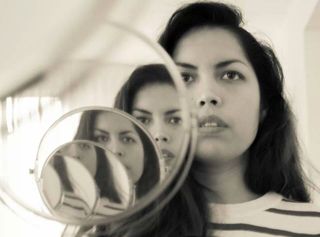I came of age amidst the release of Jane Fonda’s Workout Book and Wendy Stehling’s, Thin Thighs In Thirty Days. This was in the early 80s. I was just 13. By day, my mom and I attempted many of the exercises together in front of her bedroom mirror. By night, my mom crawled into bed with these fitness bibles to study them.
I got very clear messages that this body project was indeed a project, that it was something women undertook, often privately, painfully and obsessively, that mothers and daughters could bond, as well as compete and judge each other, over dieting and exercise, and that these images of perfect, slender bodies were the ones to which I would need to aspire.

Years later in college, it seemed as though every woman around me was struggling with eating problems. My roommate had suffered from bulimia and its rampant destruction of her body for years until she was forced to drop out of school when the repeated cycles of binging and purging finally ripped her pancreas. Our neighbors across the hall also had eating problems; in fact, in a suite of four women, one woman had anorexia, one was a compulsive overeater, and the third suffered from both anorexia and bulimia. Women were waging war on their bodies all around me, and I wanted to make sense of these self-mutilation strategies as important forms and manifestations of internal and self-directed rage.
Since college, I have engaged in research and work in the community that focuses on domestic violence and sexual assault, and exploring these issues always leads me back to issues of the body, to what we store in our bodies, to how we wield our bodies with force, or acquiesce, or resist with our bodies.
How is something as seemingly private and intimate and natural as our body also a public issue related to the social structure? Our bodies are mediated by messages from social institutions such as family, school, the government, the media, etc. Consequently, we can say that the body is socially and culturally constructed, and is the product of complex social arrangements and processes.
In the book, A Hunger So Wide and So Deep: American Women Speak Out on Eating Problems, Becky Thompson (1994) argues that women’s eating problems often begin, at least, as orderly responses to gravely unequal, chaotic and disorderly structural conditions such as racism, poverty, sexism, trauma, etc. If one conceives of the body as home, as a form of sacred space, then Thompson’s analysis is compelling for seeing how much of women’s eating problems may be related to a sense of metaphorical homelessness within one’s own body.
There is a contradictory reality and paradoxical experience of the obese in our culture: they are simultaneously hypervisible in terms of their size and also invisible because of how they are marginalized and oppressed. There is great complexity in the labels of “overweight,” “fat” and “obese.” Obese individuals suffer internally in terms of their self-concept and externally in terms of discrimination and they possess what sociologist Erving Goffman calls a “spoiled identity.” Furthermore, the sociologist, Howard Becker offers the term “master status” which shows how some statuses in society override others and take on a certain priority and meaning; here, for example, obese people are seen as fat first and foremost, and then their other characteristics are seen.
Obese people elicit blinding rage and disgust and are viewed as lazy, self-absorbed, lonely, asexual or bad at sex, and lacking willpower and self-control. This creates a self-fulfilling prophecy since people often distance themselves from obese people, people tell fat jokes, etc.
One might observe then that the more isolated obese people get in this process, they use their extra weight as a form of body armor, as a protective layer that ultimately inhibits emotional intimacy. In her riveting memoir, titled Fat Girl, Judith Moore writes, “ The fat pads me like those heavy wrappers movers put around pianos when they move the pianos from house to house. I am protected in fat... In spite of myself, I crawl deeper and deeper into the cave of fat. I add fat, pound by pound….I built walls of fat, and I lived inside.”
The issue of visibility is gendered since women are socialized to get pleasure from people thinking of them as tiny and taking up less and less space. Today, we see girls and women aspire to be a size zero or even a double zero. But if zero is nothing, why would we aspire to be that which does not exist?
In a culture where the size zero phenomenon figures prominently in adolescent females and women’s consumer culture, albeit next to warnings about an epidemic of obesity, the juxtaposition oddly makes sense though---obesity exists as a form of social control exerting fear that if you do this or that, you, too, might become part of this dreaded social category.
In my classes at the university, students often disclose intimate and painful stories of what it is like to live in their bodies---bodies that were not always safe spaces for them or that ever felt like home. They describe intense and overwhelming family criticism and cultural, racialized, and gendered pressures to look a certain way, as well as the ways that their bodies stored trauma, fear, grief, rage, betrayal, and obsessions. It seems that a war of sorts has been waged against my students’ bodies and some resisted and fought back by waging an internalized war on their own bodies in the form of compulsive overeating, anorexia, and bulimia.
For example, Jody states: “Since moving away to school, my parents still remind me that I am still ‘chunky’ and they wanted me to join the college track team so that I could lose those extra pounds. When I told my dad that the coach put me on the sprinting team, he said to me why would your coach do that, doesn’t she look at you---you’re not fast enough, nor are you skinny enough. I remember when I got a C+ on a test in one of my science classes a few years back, my dad said ‘That’s not good enough if you want to become a nurse, nurses don’t get C'S, so you can do either two things-- study really hard to get a higher grade or lose a good thirty pounds so that a wealthy man will find you attractive and support you for the rest of your life.’”
Another student, Carla, discusses the impact of race and culture on her sense of her weight: “I have been ridiculed most of my life for so many things because I embraced a white culture. But the one aspect of my heritage I could never really escape was my body type and that means I will be stuck with these big thighs and butt for the rest of my life. My weight constantly fluctuated and there were many times when I was called fat to my face. Needless to say it hurt me a lot because I didn't see it but apparently I was offending people because I could not restrain my obesity. I would cry myself to sleep and I would always put my friends in these horrible positions when they were posed with the question: Am I fat? …I don't regret losing weight because I am happier now but I do regret letting other people get to me.”
Another student, Michelle, describes how she came to view her own body vis-à-vis interactions with others and how it often led to her own self-loathing until the moment when she ultimately came to regard beauty in other women’s honesty about their bodies: “When I was in the sixth grade, I starved myself for weeks with only water and juice so I could look like this new girl in my class who was Brazilian and thin as could be, but then one day, I had my period and was at basketball practice when I passed out. From there on I decided to not let my weight get to me until college when I gained a massive amount of weight freshman year so I started to lose weight again, but this time it didn’t work because still today when I go home for the weekend my church members will say ‘you are getting bigger by the minute’ and my doctor says I am obese, my family says I look pregnant or like a two family house…so, those girls in our class who are able to discuss their struggles with their bodies, well, to me they are pretty.”




